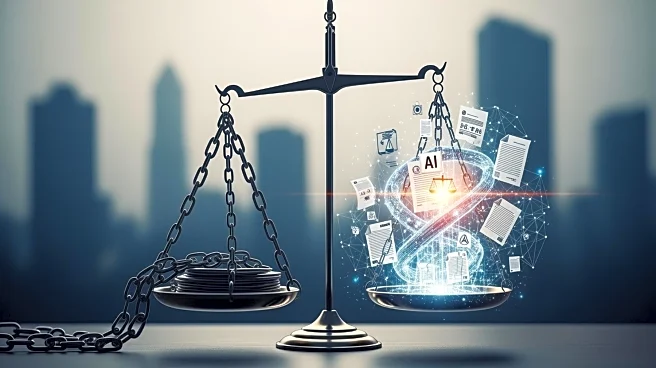What's Happening?
OpenAI, a leading artificial intelligence company, is facing allegations from several nonprofit organizations that it has employed legal intimidation tactics to silence critics. At least seven nonprofits
have received subpoenas from OpenAI, which they claim are overly broad and intended to extract private information. These subpoenas are part of a legal battle between OpenAI and Elon Musk, with OpenAI suggesting that the subpoenaed nonprofits are connected to Musk. The nonprofits have been critical of OpenAI's restructuring from a nonprofit to a for-profit public benefit corporation. Critics argue that this change could prioritize profit over OpenAI's charitable mission. The subpoenas have raised transparency questions about the funding and coordination of these nonprofits, despite most having no direct involvement with Musk or the lawsuit.
Why It's Important?
The use of subpoenas by OpenAI against nonprofit organizations raises significant concerns about the impact on free speech and advocacy. If these legal tactics are perceived as intimidation, it could deter nonprofits from voicing criticism against powerful corporations, potentially stifling public discourse and advocacy efforts. This situation highlights the tension between corporate interests and nonprofit missions, especially in the rapidly evolving field of artificial intelligence. The restructuring of OpenAI from a nonprofit to a for-profit entity is a pivotal moment that could influence how AI companies balance profit motives with ethical considerations. The outcome of this legal battle may set precedents for how AI companies interact with critics and manage public perception.
What's Next?
The legal battle between OpenAI and Elon Musk is ongoing, and the subpoenas issued to nonprofits may lead to further scrutiny of OpenAI's tactics. Nonprofits involved may seek legal recourse to challenge the subpoenas, potentially leading to court rulings on the appropriateness of such legal actions. The controversy could prompt discussions among policymakers and industry leaders about the need for regulations governing AI companies and their interactions with critics. As OpenAI continues its transition to a for-profit entity, stakeholders will be watching closely to see how it navigates these challenges and whether it can maintain its commitment to benefiting humanity.
Beyond the Headlines
The broader implications of OpenAI's legal tactics against nonprofits could extend to ethical and cultural dimensions within the tech industry. The case underscores the power dynamics between large tech companies and smaller advocacy groups, raising questions about accountability and transparency. It also highlights the potential for legal systems to be used as tools for corporate influence, which could have long-term effects on how public interest organizations operate. The situation may catalyze discussions about the ethical responsibilities of AI companies and the importance of maintaining open channels for criticism and dialogue.









